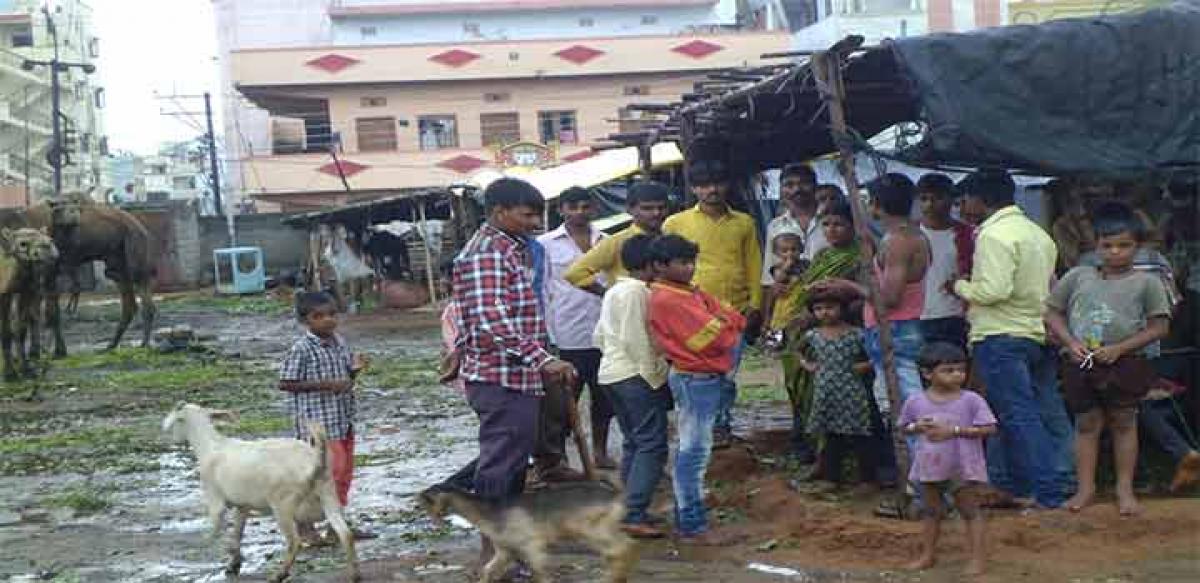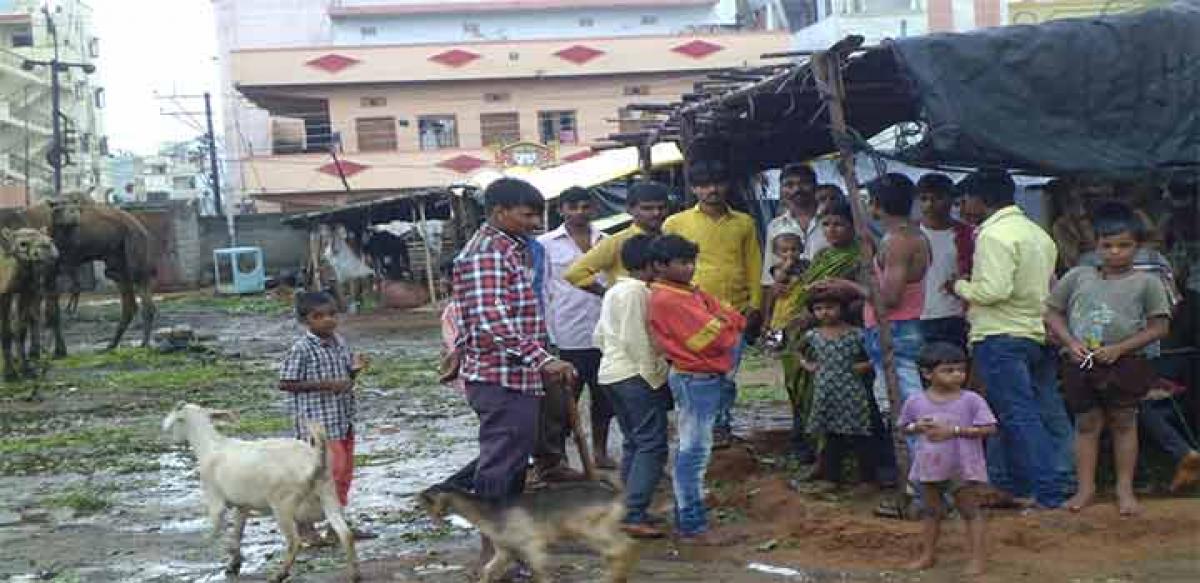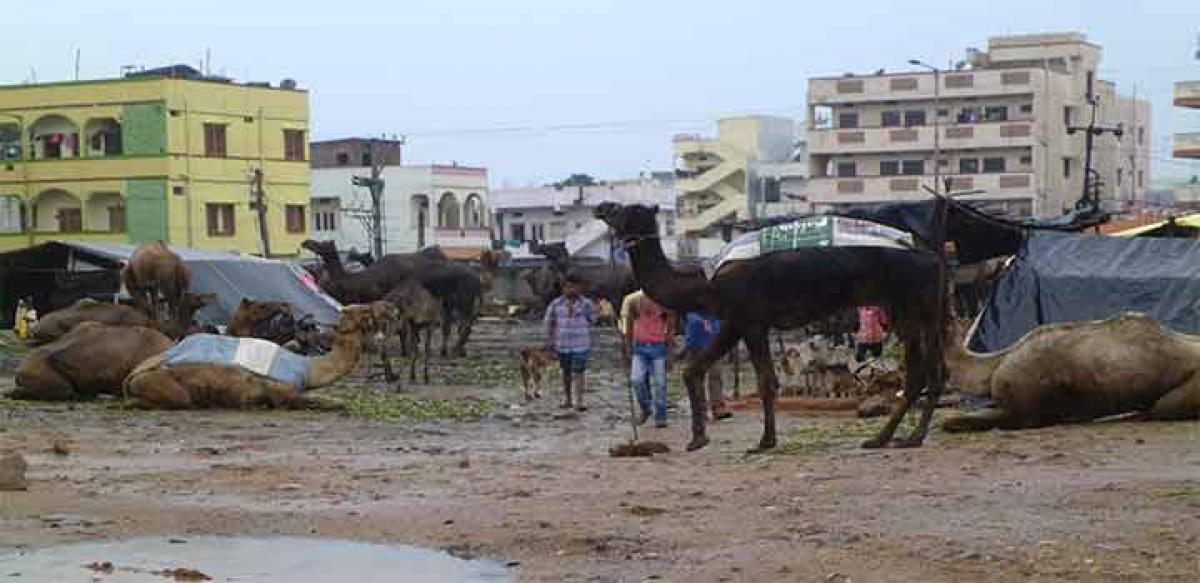Spawning a life out of ship of the desert

They lead a nomadic life and earn a miniscule amount of Rs 100-125 each day in the off-season, which gets trebled during what they presume as the peak months.
They lead a nomadic life and earn a miniscule amount of Rs 100-125 each day in the off-season, which gets trebled during what they presume as the peak months.

Apart from catering to the well-being of the family, which normally comprises of at least five members, the economically-deprived sections have to feed the animal, which is the only source of livelihood that they know of.
Call it providence, fate of destiny or whatever but the irony is that these wandering folks are quite ‘contended’ with the earnings.
They brush off the hardships, the absence of a secure dwelling place (a worn-out rain-proof protective rooftop in the rainy season and a cloth-roof during summers) and laugh away at the daily chore of trekking to a substantial distance to get water among other equally boredom-bearing routines.
That in a nutshell is the life of hundreds of families that are in the city having come all over from far-off rustic regions in Rajasthan and Madhya Pradesh to eke out a living accompanied by the ‘Ship of the desert’, the camel, which is their sole bread-earner.

Never part of any circus group, these animals are showcased for the entertainment and amusement value they provide when used for the popular camel rides that are a big hit with children. Mostly found camping in Guddimalkapur, Malakpet, Lalapet and Bagh Amberpet apart from some scattered here and there, the families live on the earning the animal fetches.
Quite many of these migrants are located elsewhere in Telangana State and Andhra Pradesh. It is very common to see camels, accompanied by the owner/trainer going around localities of Hyderabad.
“We have become oblivious of the travails and physical overbearing because of moving around from one locality to another. But then that is what keeps us in the business.
We have to take extra care of the camels and their young ones, particularly when there is a sudden change in weather conditions,” points out Narayana Singh, a camel owner who ‘operates’ in the Mehdipatnam area.
Unlike many from his generation, his family elders, who stay rooted in Indore, still stick to the traditional livelihood method, using camels as carriers of goods.
Pratab Singh, who stays in Lalapet, explains that festivals like Ganesh Chaturthi, Dusshera and Navaratri bring in extra revenue because “We are called for family functions.
On rare occasions, some families hire us for joy rides during birthday celebrations of their kids. Going around tourists spots will fetch some extra income. In fact, a more rewarding outing is when the camels are hired during film shootings.”
“Taking good care of the animals (alas some are woefully unfit) is a priority, which is understandable. A sizeable chunk of the earnings goes towards procuring their feed, which includes neem, chadu and various other kinds of leaves and herbs.
To make an economic sense of the nourishment, they normally buy from nearby government-run markets,” explains Mithun Sinder, another owner staying at Bagh Amberpet.
However, the problem comes with shelters for the animals, which are left roofless during winter and rainy seasons while makeshift cotton tents provide a little bit of comfort during summer. It is ditto for the camel keepers and their families.What comes as a blessing in disguise is the generous help that is provided by Blue Cross.
Sunil Morai, who also has been in the city for over a decade, says that Blue Cross has been extending support by providing them with medicines that are required for the camels, which are exposed to different climatic conditions.
Meanwhile, some of the children go to schools. The oldest of the lot is studying eighth standard at Sharada Vidhya High School. Bablu Bosai, a fourth standard student, has a twinkle in his eyes while telling, “I know English,” much to the delight of the parents standing around.
Refusing to be drawn into any controversy, Narayana asserts, “We follow Hindu traditions and therefore won’t encourage animal sacrifice during festivities like Bakrid. Although, quite a few ask us to sell our camels, we do not entertain such pleadings.”
Despite the sorry state-of-affairs, these families have no intentions of moving out of the city. They are not even bothered at the ‘settlers’ status as long as they get to enjoy their daily share of bread.
By:Suharika K Rachavelpula




